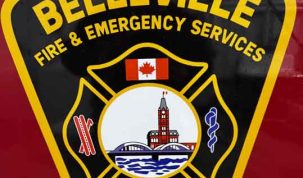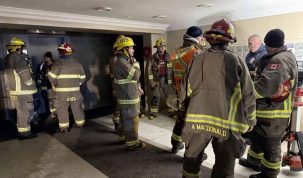The President of the Police Association of Ontario has major concerns with Bill 175, the Safer Ontario Act.
In fact, not only does the PAO have concerns, but so does the Ontario Provincial Police Association along with the Toronto Police Association.
Bruce Chapman has been a police officer for 34 years with the Peel Regional Police Service. Since 2015 he has been full-time President of the Police Association of Ontario which represents over 18,000 members.
The Provincial Government has long spoken about bringing changes to the Police Services Act.
But some of the changes approved, aren’t necessarily for the better says Chapman.
With conversations starting in 2011, the revisions were initially supposed to be written around 2013.
“The majority of the discussions were with a number of stakeholders including AMO, Police Services Boards, Chiefs, Associations and that started the Future Police Advisory Committee and that was under the premise of community safety.”
In 2015 the Government continues with public consultation throughout the province receiving approximately 1,700 replies from a number of stakeholders
In 2016, Ontario Court of Appeal Justice Michael Tulloch was commissioned to do Town Hall and stakeholder consultations throughout Ontario for oversight.
Looking at the Special Investigations Unit, Office of Independent Police Review Director (OIPRD) and Ontario Civilian Police Commission (OCPC).
Tulloch offered a report in 2017 making 129 recommendations which eventually came together to form part of this massive Bill known as The Safer Ontario Act, Bill 175 which incorporates six acts.
The Coroner’s Act, Forensic Laboratory Act, Missing Person’s Act, Oversight Act, First Nations Policing Act, and Police Services Act.
The first reading of the Bill was on November 2 2017 the Bill was introduced and recently the Bill received the third reading and royal assent on March 8, 2018
“Unfortunately for Ontario’s policing professionals, and the communities and the people they protect, this legistlation does not live up to its name,” stated a joint release issued by the Presidents of the three police associations on March 8.
With the “hasty passage” of Bill 175 the associations state they are concerned the Bill, “will hurt policing efforts in the province.”
Significant challenges include, the privatization of some policing functions, and that oversight agencies have not been required to abide to legislative timeline requirements which could subject policing professionals and their families to unfair and wasteful administrative delays.
During an interview with Today’s Northumberland, Chapman said the PAO supports oversight in policing.
“We’ve been very strong advocates.”
“ We were strong proponents of oversight and we still are. Accountability, transparency of our members is critical.”
Though the PAO agrees with the majority of items in the Bill, they strongly oppose some of the Bill including privatization in policing.
“It is the probably one of the most worrisome issues that the Associations have with the government,” said Chapman.
“This comes back to the unfair and untrue rhetoric by Municipalities or AMO of the un-sustainability of police costs.”
Chapman explains that calls that historically were 1 in 20 for assistance with mental health issues are now 1 in 6.
“So it shows you the focus of where police resources have gone.”
“Police are the only ones that are 24-7 as far as the service goes. So when someone is getting into homelessness or drug addiction, or mental health aspects and everything else is closed or not available to these people, then they get into crisis and the situation gets escalated and the police are called.”
If police were able to focus on core police duties and proactive policing there wouldn’t a conversation about unsustainability going forward.
Which Chapman states leads right into Bill 175 which is aspects surrounding privatization.
There was over 290 amendments to Bill 175, of those over 250 were proposed by the Liberal Government.
“So it’s pretty substantial changes to a Bill that was rushed through Queen’s Park to get passage before Government was prorogued.”
The PAO, OPPA and TPA are concerned about privatization because it gives the municipalities an option to outsource or hire private companies, or event not-for-profit corporations to be able to do some of those police duties.
“The community should be very concerned about that because there is limited oversight.”
“At a time the Safer Ontario Act enhances or increases oversight on the policing profession, you’re adding this to the Bill which takes away oversight or accountability.”
Chapman explains, the sentiment of the public is they do not want private security to have their personal information or investigate crime or police work.
Explaining the most mundane or minute calls become those that are the most dangerous, Chapman said the new Bill has made changes to separate the distinction between police and special constables.
“Special Constables serve a great role in a police service in the duties they do to assist police, but there are limitations in their ability. Their training, their ability to carry weapons.”
Government has stated, if you are a Special Constable you can no longer have any insignia on your uniform that identifies you as police.
“Because you are not.”
But that is where the confusion is regarding police and special constables.
“So now you’re not going to be able to call them police, but now you’ve added that they will fall under the direction or rules following the Special Investigations Unit following complaints.”
Before they were considering civilian members of a police service and treated the same as civilian members.
“Now you’re adding extra responsibility and fall under the SIU Director should you become involved in an issue.”
The President of the Police Association of Ontario said there is great value in special constables.
“We’ve always said about finding efficiencies and effective model of policing and that includes civilianisation of some of those duties that were done by sworn.”
But Special Constables should never replace frontline officers.
“And nor should they.”
“But they are a great value and a great resource to police services and should fall within the police service. I just worry about outside agencies being considered Special Constables, not having policies and directives that are in the best interests of the community and the best interest of their corporation.”
There are Special Constables in areas of the province that deal with transit, housing, courts, prisoner transports and the Niagara Parks Commission.
“There is good strong value when used appropriately and properly.”
But Chapman adamantly states, “the municipalities should not be using that as belief in saving a dollar or two.”
Chapman also weighs in on the controversial area of the Police Services Act that deals with suspending officers with pay.
Of all the complaints, 97% of complaints against police are frivolous or vexatious.
“We’re subject to having to deal with more complaints from upset customers then other professions are. So the presumption of innocense should always outweigh the assumption of guilt. Our position was, there shouldn’t be a suspension without pay.”
“The majority of officers that have been suspended have all come back to work and either been exonerated or the offence was so minor in nature it didn’t warrant dismissal.”
Chapman said he is aware the new changes are supported by members of the public with some suspensions without pay.
“You commit a serious criminal offense not in the performance of your duty you could be subject to suspension without pay.”
“We all hear those five to 10 cases over the last 10 years, but that’s such a small percentage of the 35,000 strong in Ontario. That’s so few and far between, but that’s what gets lost in the message in the headline that people read.”
“Nobody supports bad behaviour even amongst the police profession.”
The bottom line Chapman says, “this Bill was rushed.”
“There won’t be cost savings to municipalities with the privatization of police functions and their won’t be oversight and accountability.”
“Our fear is it’s going to be similar to the UK model and anybody that looks over there if you cut 20% of your police workforce, you now have between 14% to 20% rise in crime.”
“That should be concerning to everybody.”
For more information about Bill 175 go to:






















